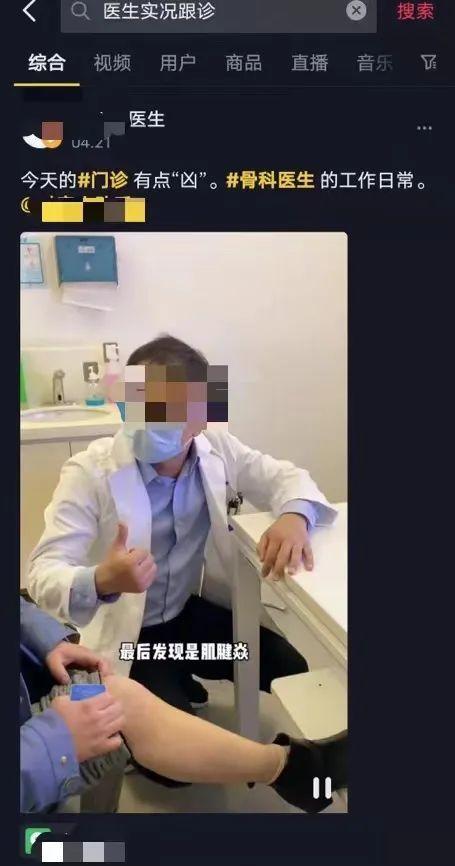The doctor's live broadcast while asking questions is obviously more harmful than beneficial.
The full text is 1121 words, and it takes about 2 minutes to read
Text/Li Wanyou Editor Li Xiaoxiao Proofreader Liu Jun

▲ Searching for "doctors' live follow-up" will appear a large number of short videos of doctors live-streaming medical treatment. Photo/Screenshot of a video platform
"It's so common that not only many of the doctors in our hospital are doing live broadcasting, but so are other hospitals, but few people have considered the boundaries of live broadcasting." According to legal daily, as a middle-level manager of a well-known hospital in China, Sun Ting is worried about more and more peers around her investing in live broadcasting. Sun Ting's own hospital also has this phenomenon, and some patients also have doctor-patient disputes due to the doctor's live broadcast in the clinic, and call the "12345" service convenience hotline to complain about the hospital.
Doctors live broadcast, some for the popularization of medical health knowledge, some to earn extra money, some both. But regardless of the original intention, the live broadcast while asking questions is also debatable.
Patients need a relatively quiet and friendly medical environment, and some may be nervous and even need to be soothed and relieved by a doctor. In this case, the doctor asks for a live broadcast while asking, and the patient's poor sense of experience is not to say, which is more likely to aggravate the patient's nervousness, which is not conducive to disease diagnosis and treatment. In fact, patients often do not want outsiders to be present, let alone online onlookers.
Therefore, the doctor's live broadcast while asking for a diagnosis gives the patient a bad medical experience, especially if it is not clearly informed, nor does it seek the patient's opinion, which is not only easy to cause disgust, but also easily invades the privacy of the patient, even if it is not live broadcast to the patient's face or mosaic, it is extremely inappropriate, which is an obvious transgression behavior.
Strictly speaking, the disease is the privacy of the patient, and doctors should not spread it unless it is necessary for the public interest. Any live broadcast will inevitably reveal the patient's information. The Physicians Act clearly stipulates the privacy rights of patients, not only can not be directly disclosed, any indirect possible disclosure is not allowed.
In fact, doctors see a doctor is a highly professional work, both professional and focused, in order to enhance the accuracy of diagnosis, and then the right medicine. If the doctor also records a video while consulting, it is easy to give people the feeling of "show", and it is inevitable that they will be distracted, and the professionalism and effect of diagnosis and treatment are bound to be greatly reduced, and even the wrong disease may be seen, the wrong medicine may be prescribed, resulting in medical accidents.
▲Infographic. Figure/IC photo
Professional things should not only be done by professionals, but also focused on doing. Although the doctor's live broadcast while asking questions can play a certain role in popularizing medical knowledge, the disadvantages obviously outweigh the benefits. If there is a complaint as a result, it also damages the image of the doctor and the reputation of the hospital.
In this way, it is not to oppose the new thing of doctors' live broadcasting, the key is to distinguish the occasion and clarify the responsibilities, and not to live broadcast while asking questions. If doctors broadcast live in non-workplaces, popular medical and health knowledge should be supported and promoted, but they should also meet the requirements of doctors' practice norms.
It is conceivable that with the development of Internet medical and social platforms, more and more doctors are bound to participate in live broadcasts and carry out medical science popularization activities, but there must also be enough vigilance against the hidden risks that exist. In this regard, the relevant parties need to study countermeasures, establish a normalized supervision mechanism, standardize and manage, clarify the boundaries, give full play to the strengths and avoid the shortcomings, and let the doctors live broadcast to better meet the needs of modern medical treatment in the new situation and benefit the people.